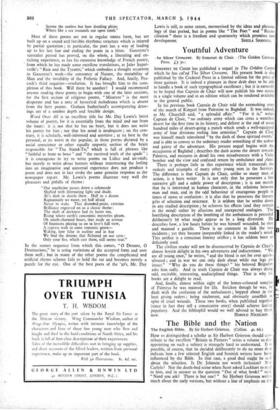Youthful Adventure
SOMERSET DE CHAIR has published a sequel to The Golden Carpet which he has cal!ed The Silver Crescent. His present book is also published by the Cockerel Press in a limited edition for the price of three guineas. It is indeed a pleasure in these drab days to be able to handle a book of such typographical excellence ; but it is earnestly to be hoped that Captain de Chair will now publish his two stories in a single volume and in an edition which can be rendered available to the general public. In his previous book Captain de Chair told the astonishing story of the march of Kingcol from Palestine to Baghdad. It was indeed, as Mr. Churchill said, " a splendid affair." " For it is," writes Captain de Chair, " no ordinary army which can cross a waterless desert for the first time in its history, and deliver at the end of seven hundred miles of desert-going a punch which sends a well-equipped army of four divisions reeling into armistice." Captain de Chair was himself much stimulated " by the dash of these spirited events," and is able to convey to the sedentary reader something of the ardour and gaiety of the adventure. His present sequel begins with the occupation of Baghdad ; describes the daSh across the desert towards Palmrya, and recounts in detail his own misadventure with a Vichy bomber and the stow and confused return by ambulance and plane.
There is perhaps little in this experience which transcends the
ordeals and triumphs of many other young men in the Services. The difference is that Captain de Chair, unlike so many men of action, is a born writer It is not only that he possesses a fine narrative gift and a subtle power of description ; it is not merely
that he is interested in human character, in the relations between
man and man, and in the odd behaviour of courageous people in times of stress or confusion: it is also that he possesses the literary
gifts of selection and reticence. It is seldom that he settles down
to any studied description ; he achieves his effects (and they remain in the mind) rather by allusions and unexpected analogies. The
horrifying description of the bombing of the ambulances is preceded
deliberately bk what might appear to be a long diversion. He describes how, a few hours before he was himself wounded, he shot and maimed a gazelle. There is no comment to link the two incidents ; yet they become inseparably linked in the reader's mind. This artifice is a conscious literary artifice ; it has seldom been so delicately used.
The civilian reader will not be disconcerted by Captain de Chair's almost boyish delight in his own adventures and indiscretions. " We
are all young once," he writes, "and the blood is not for ever quick- silvered ; and in war we can only dash about while our legs are intact." " Why do you do these things? " his beloved Brigadier asks him sadly. And in truth Captain de Chair was always doing odd, excitable, interesting, undisciplined things. That is why his books are a delight to read. And, finally, almost within sight of the honey-coloured temples of Palmrya he was maimed for life. Stricken though he was, he dealt with the confusion of the ambulances ; hopped about in the heat giving orders ; being exuberant, and obviously unselfish in spite of cruel wounds. These two books, when published together (since in fact they tell a consecutive story) should achieve lasting populariy. And the bibliophil would we well advised to buy them


























 Previous page
Previous page